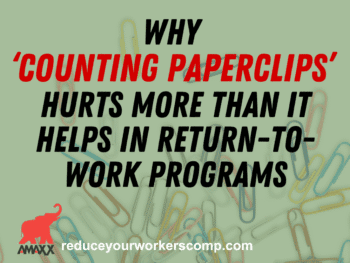Return-to-work is often an issue that claim management teams do not think about until after a workers’ compensation claim has developed and wage loss maximums are paid out. Instead of thinking about the issue later on in a claim, it is important for claim management teams to take a proactive approach and start thinking about return-to-work issues immediately once an injury occurs.
The best way to be prepared at the time of injury is to have the systems in place to appropriately respond. Communication is critical in a return to work program, both with the injured worker, as well as the medical provider.
Communication with the Injured Worker
Being able to communicate with the injured worker is a key element to an effective program. It is important to remember that everyone communicates differently. The most important element to remember is the employee needs to feel cared for, and have proper expectations for how the process will work.
Transitional Duty Policy
A proper Transitional Duty Policy will include elements of the types of jobs, nature of assignments, how medical appointments are handled, length of transitional duty, rate of pay, and coordination with relevant laws.
Post-Injury Communication
Care is demonstrated through a Get Well Card after the injury, placing a First Day Phone Call, and holding weekly meetings with the injured worker. If you are able to identify and communicate with workers in a manner that best serves their needs, every claim outcome will be improved.
Medical Care Information
Injured workers need to know critical information such as where to obtain treatment for their injury and how to obtain prescribed medications. Best practice TPAs give employers the ability to print on demand a personalized road map that contains relevant information to guide employees through the medical system. The document includes the date and nature of injury, claim number, network vendor contact information, and a telephone number to call with any general questions regarding their medical care. The injured worker can easily understand where and how to receive the care needed to quickly return to work.
Communication With Medical Providers
The treating physician is an important partner in the assessment and recommendation for physical restrictions that will accommodate the injured worker in transitional duty. A lack of communication with the medical provider is a common error that inhibits a successful return to work program.
Information Regarding Employer Return to Work Program
The physician needs to know: 1) that a transitional duty program exists and that the employer will accommodate injury restrictions, 2) that physical restrictions should be identified and recorded, 3) that a more detailed description of the employee’s job can be provided upon request.
The information listed should be provided in a consistent and systematic way to ensure a successful outcome. The physician should be provided a form to list the physical restrictions of the injured worker and be instructed to fax this information to the claims handler.
Information Regarding Utilization Review
Workers’ compensation insurers have limitations and requirements on what medical care they can provide without the insurers approval, and what medical care needs to be approved through Utilization Review. Providing this information to the medical providers up front prevents delayed care, and more efficient and cost effective treatment. Frequent medical procedures needing prior approval can be listed on the employer provided ‘road map’, as well as a telephone number to call for procedures that require Utilization Review.
Implement Return-to-Work
With proper communication with the injured worker and the medical provider, implementing return-to-work becomes much easier. The employer can make an informed determination to provide employment that allows for the injured employee’s physical restrictions.
Transitional Duty Job Bank
A best practice in preparation for a transitional duty assignment is to create a Transitional Duty Job Bank. Work with supervisors and department heads to identify alternate assignments, and work with medical professionals like an ergonomic, physical therapist, and physician to specify how jobs can be altered to accommodate medical restrictions.
Legitimate Offers of Transitional Employment
Requirements regarding offers of employment vary from state to state. It is essential that every aspects of the job offer comply with the requisite statutes, including those for transitional duty. In addition to these requirements, it is important that every job offer include the following elements:
- Name of the task being assigned;
- Date the job offer when it is sent to the employee;
- Duration of job specific tasks that include the length of time the person is required to be in a specific position or perform movements;
- Information regarding work breaks, including the frequency and length;
- Overtime requirements; and
- Description of specific job-related tasks.
Before the job offer is submitted, it is important to review work restrictions prepared by the treating doctor. If the person preparing the offer is not familiar with the job, it is necessary to review it with a manager or view the actual job being performed.
Conclusions
Proactive claim management teams will address the issue of return-to-work at the time of the injury by providing systematic approach to communicate with essential parties. By taking this approach, it will help them address the barriers to a successful outcome and allow them to assist their employer clients in an effective manner.
Author Michael Stack, Principal of Amaxx Risk Solutions, Inc. He is an expert in employer communication systems and helps employers reduce their workers comp costs by 20% to 50%. He resides in the Boston area and works as a Qualified Loss Management Program provider working with high experience modification factor companies in the Massachusetts State Risk Pool. As the senior editor of Amaxx’s publishing division, Michael is on the cutting edge of innovation and thought leadership in workers compensation cost containment. http://reduceyourworkerscomp.com/about/. Contact: mstack@reduceyourworkerscomp.com.
©2014 Amaxx Risk Solutions, Inc. All rights reserved under International Copyright Law.
SALES TO PAY FOR ACCIDENTS CALCULATOR: http://reduceyourworkerscomp.com/sales-to-pay-for-accidents-calculator/
MODIFIED DUTY CALCULATOR: http://reduceyourworkerscomp.com/transitional-duty-cost-calculators/
WC GROUP: http://www.linkedin.com/groups?homeNewMember=&gid=1922050/
SUBSCRIBE: Workers Comp Resource Center Newsletter
Do not use this information without independent verification. All state laws vary. You should consult with your insurance broker, attorney, or qualified professional.



























